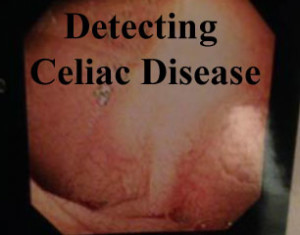5 Tips for Primary Care Physicians to Detect Celiac Disease
February 18, 2014 by Amy Leger | G+ Amy Leger Many of us have stories about how our (or our family member’s) primary care physicians took months or years to test for celiac disease. Celiac can be a tough nut to crack — it can exhibit any of 300 or so symptoms — that is, if you’re not asymptomatic. So I can understand that it can be tough to nail down. But a recent story has one expert saying it can no longer be ignored.
Many of us have stories about how our (or our family member’s) primary care physicians took months or years to test for celiac disease. Celiac can be a tough nut to crack — it can exhibit any of 300 or so symptoms — that is, if you’re not asymptomatic. So I can understand that it can be tough to nail down. But a recent story has one expert saying it can no longer be ignored.
Recently, Medscape interviewed Dr. Joseph Murray, the co-author of the latest guidelines entitled, American College of Gastroenterology clinical guidelines: diagnosis and management of celiac disease which was published in the American Journal of Gastroenterology in April of 2013. The current interview highlights what primary care physicians (PCP) should know to help find and treat celiac disease in their patients.
Tip #1: Look at all ages for possible celiac
Dr. Murray says just because a practitioner doesn’t think he or she has seen celiac in practice, doesn’t mean one or more of their patients doesn’t have it. He said in the Medscape interview “If you were a PCP with a panel of 1000 patients, most of them white, you could have 7-8 patients in your practice with celiac disease.”
He says new-onset celiac cases happen in all ages, but particularly in people ages 40-50 years old and older. Some older diagnoses may have even previously tested negative for celiac. “That is why there is the current profusion of guidelines and an effort to make PCPs understand that celiac disease is a condition they really have to be aware of now,” Murray says. “We can no longer ignore it; it is becoming much more common.”
Tip #2: Consider the abnormal
Doctors should be thinking beyond the classic symptoms when it comes to detecting celiac.
There are so many symptoms to celiac disease (see list of approximately 300 produced by the University of Chicago’s Celiac Disease Center). Many of which also can be used to diagnose other conditions. From your classic gastrointestinal symptoms like diarrhea, stomach pain and bloating, to reproductive (infertility, miscarriage), skeletal (osteoporosis), neurological (peripheral neuropathy, foggy brain, memory loss), and cancer, undiagnosed celiac disease can have devastating results.
They could have NO symptoms at all. The prevalence study on celiac in the United States which published in the Archives of Internal Medicine in 2003 found 60% of children and 41% were asymptomatic.
Sometimes, Dr. Murray says, the symptoms come on so subtly, that the patient doesn’t even know they have them. Hint: having fatty bowl movements 5-6 times a day isn’t normal, neither is being constantly and extremely constipated.
Tip #3: Suspect celiac disease
Physicians won’t test for a disease they don’t suspect. Dr. Murray says in the Medscape interview, doctors should raise their suspicion, “if there is low suspicion, physicians will not test for it. If they are not going to test for it, they are not going to find it.” Murray recommends doctors ask about family history of celiac, just like when you ask about high blood pressure, heart disease, etc.
Tip #4: Keep patient on gluten until the biopsy
Patients must have gluten in their system in order to get a positive diagnosis for celiac disease. Do not tell patients to go gluten free after the serology (blood) test and before the biopsy. Dr. Murray says in the Medscape interview if people go gluten free before a final diagnosis, they will eventually have to do a gluten challenge to confirm the diagnosis.
The biopsy is an important tool, especially for adult cases, so doctors can track the healing process. If there is no gut healing on a gluten free diet, that can lead to more serious issues, like refractory celiac disease and higher risk of cancer.
Tip #5: Learn about celiac disease, for follow up visits
Dr. Murray says after a celiac diagnosis, patients should eventually resume seeing their PCP if the PCP is familiar enough with the disease. “We have found that a lot of PCPs or gastroenterologists aren’t interested in follow-up in these patients.”
Why? It could be lack of familiarity with the disease, says Dr. Murray in the interview, but something else in his answer was also interesting,”In the United States, for many years, the celiac community has felt medically orphaned. No one was really taking ownership of their care so they were basically self-educating…often celiac patients felt they knew more than their providers. That doesn’t necessarily enhance trust and dependence.”
I think these were the top, most immediate takeaways from the article, but there is much more information available. Please check the Medscape report for more detail on this topic.
*I am not a medical doctor. If you have questions about celiac disease please contact your medical practitioner.
Tags: biopsy, celiac, detection, diagnosis, diet, disease, doctor, gluten, gluten-free, symptoms, test, testing



Leave a Reply